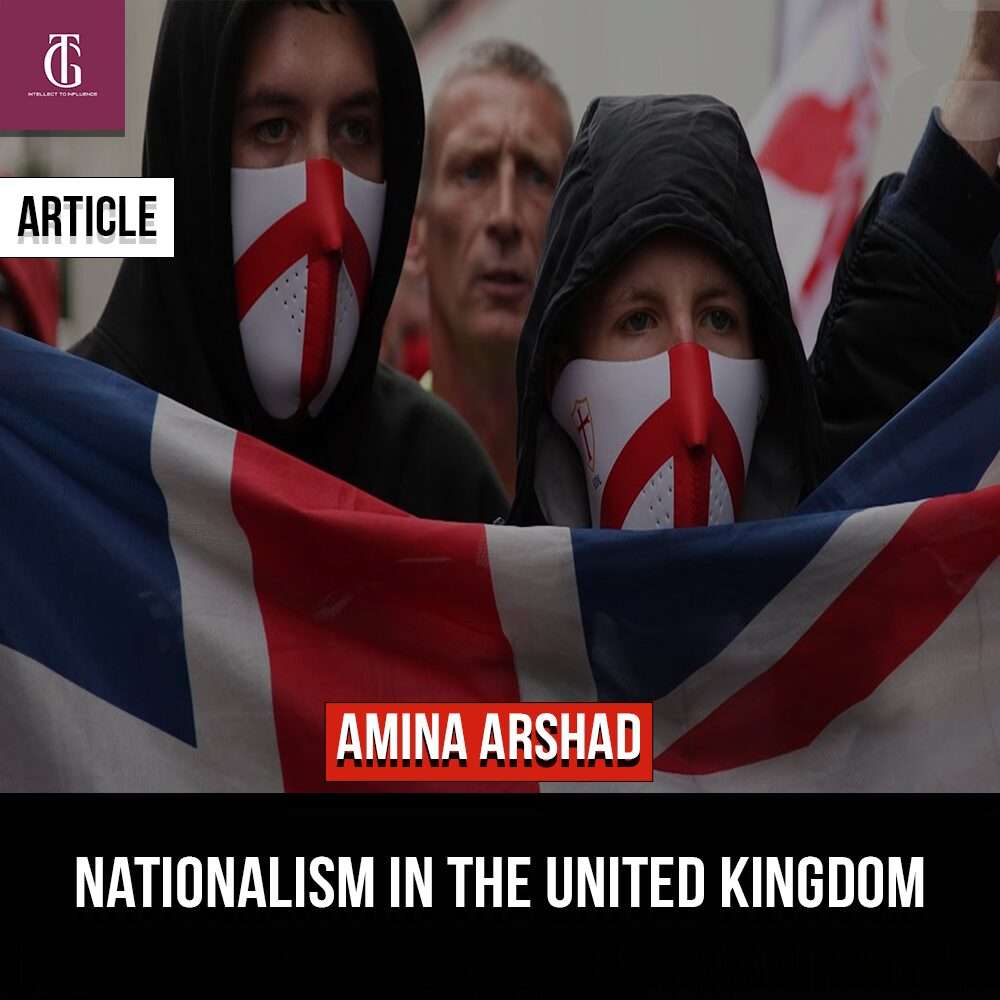
Nationalism, for some, is a very sacred notion, and some critics argue that it threatens the integrity of a state or a group. During the interwar period, there was a rise in nationalist movements, which formed the basis for the emergence of many independent states and tore the shackles of colonization. This sense of nationalism gave people the right to establish their state according to their will and maintain their law and order. This sense set them free from the authoritarian rule. But on the other hand, this nationalistic ideology promoted the rise of authoritarian regimes. In some cases, authoritarian leaders or regimes have exploited nationalist sentiments for political purposes, while in other instances, nationalism has emerged as a response to authoritarian rule.
Nationalistic sentiments lead to separation and independence of many nations. It incorporated the sense of identity and integration of a state. Following the extensive losses experienced in World War I, several European states were reluctant to engage in another conflict. Given the profound impact of WWI, both Britain and France sought to steer clear of involvement in the Second World War. But Hitler’s policies and expansionism forced many states to preserve their nation’s interest at every cost and to control Nazi Germany of its brutal actions. Despite all the violent and aggressive movements, Europe was relatively peaceful during the second half of the 20th century. The European Union was established to promote peace and cooperation to counter the unrest in Europe. It proved to be an antidote against aggressive post-war nationalism. The concept of open borders and trade relaxation within the European Union (EU) was a stride toward the integration of Europe. It established standard rules and laws, yet some critics contend that the EU possesses excessive powers, resembling a quasi-country. However, the EU has encountered numerous challenges, including Brexit, the status of Ireland, the crisis involving migrants and refugees, and the Russia-Ukraine War. Specific laws imposed by the EU were deemed unacceptable by member states as they perceived the union to exert significant control over their national sovereignty.
The history of the United Kingdom sets it apart from its neighboring states, boasting a rich and unique narrative. Unlike its counterparts, the UK has never succumbed to external rule. Comprising England, Wales, Scotland, and Northern Ireland, the United Kingdom is a harmonious amalgamation of diverse identities. Presently, the nation grapples with crises stemming from Brexit and questions of identity. While commonly referred to as English, the people of England have not universally adopted this label; instead, their neighbors, including Scots, Welsh, and Irish, often define them by other terms.
Nationalism within the United Kingdom faces challenges, particularly in the context of Brexit and the complex status of Northern Ireland, illustrating the intricate nature of a country that embodies multiple distinct entities. The United Kingdom saw a wave of separatist movements after Brexit. The Right-Wing Party and the Conservative Party highly saw the desire to leave the EU. It was further divided into two factions; some wanted to stay in the EU, and some found it a great idea to leave the EU. In 2016, a referendum was organized, showing that 52% wanted to leave the EU. A propaganda campaign was initiated that brought instability to the UK.
After Brexit in 2020, the UK had to face some drastic impacts, i.e. tariffs were imposed; this brought difficult circumstances for companies and business elites. Companies suffered colossallosses. Employment was highly affected. People started propaganda against their state because there were no employment opportunities. The immediate effect of Brexit was on the economy. After the burdensome situation in the UK, its states started separatist movements.
The case of Scotland is widely recognized. Scotland consistently advocated for EU membership. However, following Brexit, Scotland aimed to pursue independence and rejoin the EU. The referendum, however, was won by the Unionist Party, which advocated for maintaining the union with England. The potential independence of Scotland could pose a significant economic setback for the UK, potentially impacting the overall economy. Welsh Nationalism is somehow different from Scotland. It usually focuses on cultural and linguistic aspects. So, it wanted to leave the EU, which shows its deep connection with the UK.
The part of the UK, i.e. Northern Ireland, has a different case. It was not part of Great Britain earlier. It shares borders with the Republic of Ireland. Northern Ireland was created when Ireland was separated by Act 1920; having the majority of Unionists, they decided to stay with the United Kingdom while its other half, i.e. Southern Ireland, was set free in 1922. So, the integrity of the United Kingdom is under threat from its other side. The other form of nationalism is English Nationalism or Britain Nationalism. This poses a major threat to the UK. They showed through their actions, i.e. the British Jack Flag was replaced by the English Nationalist Red Cross of St. George on a white background.
Once a vast global power, the British Empire has significantly diminished over time. The United Kingdom is grappling with heightened tensions, particularly in Scotland, where the desire for independence is gaining momentum. Scotland could set a precedent for Northern Ireland if it were to achieve independence. The Scottish Nationalist Party (SNP) has pledged to request an independence referendum from Westminster. In 2014 a similar vote took place, resulting in Scotland’s remaining in the UK.
Afterthe United Kingdom decided to leave the European Union, there has been renewed interest in leaving the UK to rejoin the EU.However, the path to independence is intricate, posing numerous challenges. One primary concern would be citizenship, as Scots are dispersed across the entire UK. Managing this issue for an independent Scotland would prove difficult.
Additionally, economic considerations come to the forefront. Scots can freely seek employment anywhere in the UK, but independence could restrict such movement. The privileges enjoyed within the UK may not be easily replicated by an independent Scotland. Yet, Scotland holds a valuable asset in its northern coast’s oil reserves. Scotland could control the oil trade with England by imposing restrictions and tariffs if independent. This could create economic difficulties for Britain, potentially making it dependent on Scotland and giving the new state a robust economic position. The prospect of independence also raises the possibility of a name change for the United Kingdom, followed by alterations to the national flag. The push for Scottish independence poses complex challenges ranging from citizenship to economic considerations, with potential repercussions for Scotland and the United Kingdom. After Brexit, it is known as Scexit.
Another nationalistic crisis in the United Kingdom is of Northern Ireland. It is basically the byproduct of historical events but later it led to political nationalism in modern Ireland. Ireland faced crisis of beliefs between Catholics and Protestants. The series of violence continued from 1960s to 1998 and those decades of conflict are known as the Troubles. Some conflicts among them were so bitter that they went beyond borders and involved third party. In the case of the Troubles, U.S. Senator George Mitchell played the role of third party to settle the issue.
The resulting peace accord, the Good Friday Agreement, was signed on April 10, 1998. It is also known as Belfast Agreement. It allowed Northern Ireland to create its own government and handing over the authority on some issues like health, education and power sharing between pro British and pro Irish parties. Due to this, the paramilitary group of Northern Ireland became disarmed and the peak of violence came down. Ireland contains majority of Catholics while Northern Ireland is pro British protestant.
In the 1960s, Northern Ireland’s Catholic minority was frustrated over issues like unequal access to housing and jobs; that led to a civil rights movement. In 1969, the British also deployed their military to curb the unrest. Catholics called themselves as pro-Irish and nationalist; they wanted Northern Ireland to unite with the Republic of Ireland. Protestants largely called themselves pro-British and unionist, they opposed leaving the United Kingdom.
Northern Ireland became separated from Ireland but it is not still peaceful because post conflict societies always face the issues of weak government and divided populations. It was in favor to join the United Kingdom but after Brexit more tensions arose. Because many people in Northern Ireland voted against Brexit and now after Brexit, they feared that strict border could return. During the Troubles, the borders were the checkpoints of violence and the people of Northern Ireland are worried about their integrity and status. It is the failure of English Crown to successfully integrate Northern Ireland into its state.
This was the case of the United Kingdom where people are struggling for their separate identity, and the enthusiasm is being provided to them through nationalistic sentiments. A nation cannot stand for centuries if it is void of nationalism. This ideology becomes the reason for the people to sacrifice their lives and everything for the protection of their values, rituals and integration. There are a lot of nations who are struggling for their identity and for the protection of their ideology. This ideology keeps nations alive and enthusiastic.

Amina Arshad
Amina Arshad, student of International Relations at University of Sargodha. Working as a volunteer at various national and international forums. Acting as Director Research Club , DPIR-UOS.





